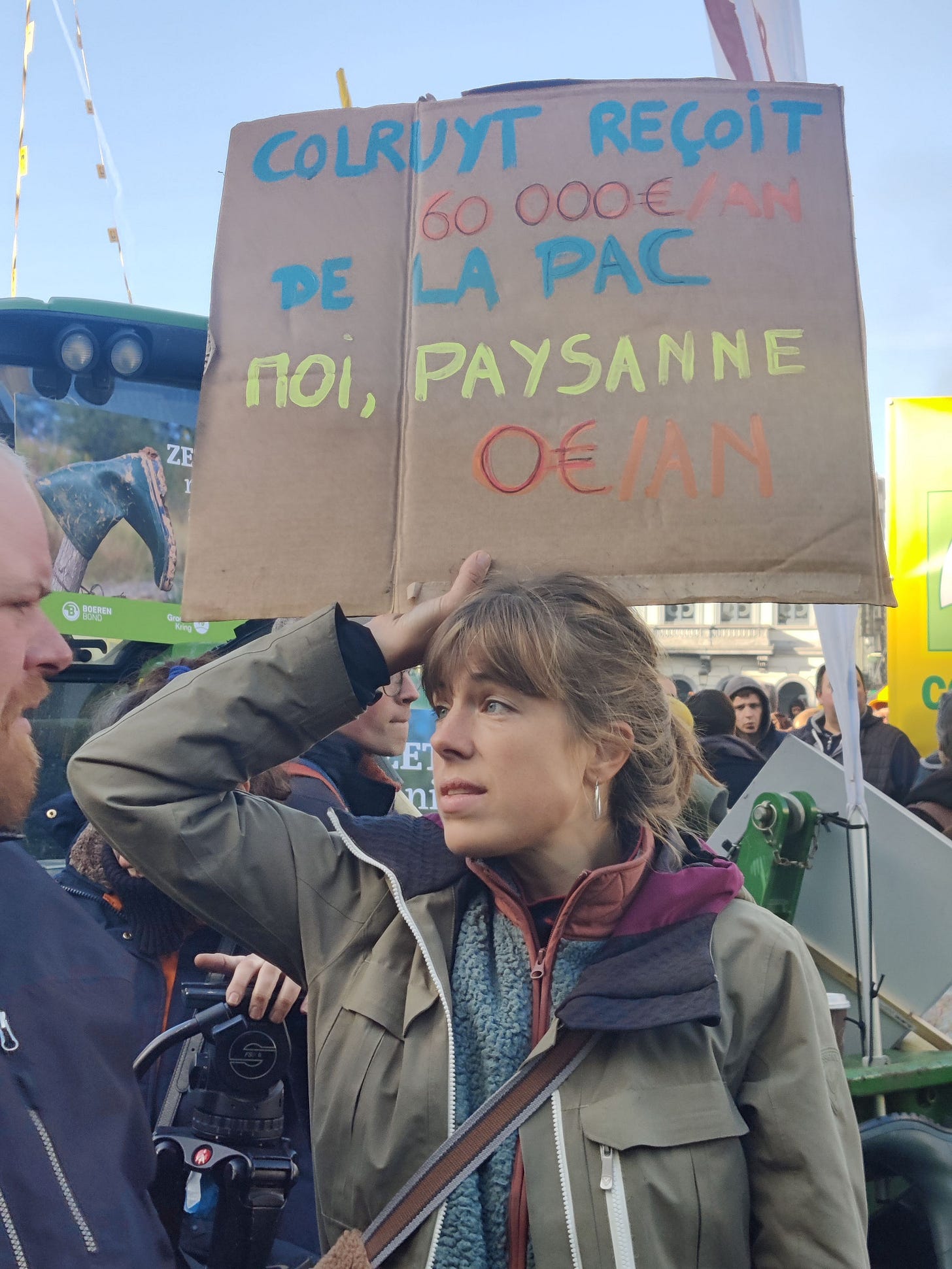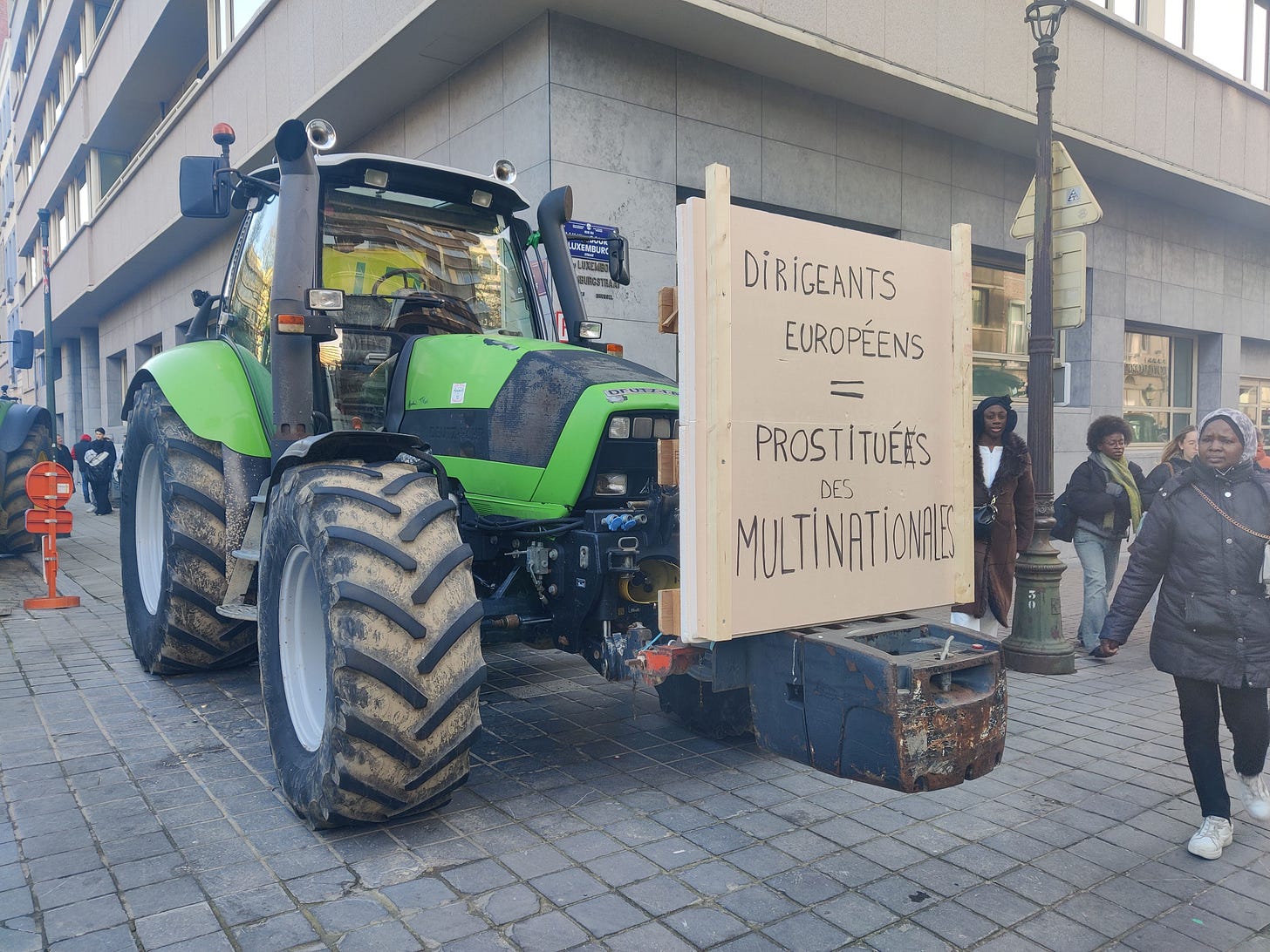Message Not Received
Farmers’ demands vs policy responses
First off, thanks for all the lovely messages wishing me well - I’m much, much better thank you, although still sounding like Mick Jagger after a few packs from time to time - and for enjoying last week’s issue.
It makes me think there’s definitely room for more uplifting stories in the climate and food space and I’m going to try and make it a regular thing, perhaps doing two or three Happy Pickings editions every year.
So if you come across any stories that inspired you/bring you joy, please do share! They don’t have to be solution-oriented either but stories that make us see things differently. By the way, I also have thoughts about what many term to be ‘solutions journalism’ but that’s for another issue.
This week, we’re back to regular scheduling. It’s on a topic that is turning out to be my regular bugbear - the policy responses to farmers’ protests in Europe.
In the meantime, an appeal to please support media and journalists that are doing good work. May 3 is World Press Freedom Day. Journalism is both a dangerous and thankless job in places where it is needed most and the industry itself is in a terrible state. Let's not wait till independent media disappears to write eulogies about its importance.
Below is the op-ed I wrote for Land & Climate Review, an online platform on the latest research and analysis around the nexus of land use, economic theory, climate change and culture. The original op-ed, which came out on May 2 (Thursday), is here.
I argued that the dismantling of green polices does little to address long-standing systemic issues that force farmers to rely on subsidies, turn to agrochemicals, and accept unfair prices and that as long as those issues are ignored, European farming will continue to be in crisis.
I had planned to write about a different topic but with the European Parliamentary elections in two months’ time and two other stories on farmers’ protests coming out on the same day as the op-ed, I decided to return to this topic.
Regular readers of Thin Ink will be familiar with my thoughts on #WhatsHappeningInEurope, but this is a really important issue not just for the future of Europe but for the world, so I hope you’ll bear with me.
Farmers’ protests are about more than green policies
So why are policymakers fixating only on them?
Europe is the fastest warming continent in the world, with temperatures increasing at twice the global rate. New analysis from the European Environment Agency (EEA) warns that Europe’s food systems are unprepared for the rapidly growing risks of climate-induced disasters; megadroughts, heatwaves, and new weather patterns are projected to cause major shocks to food security, financial markets, and supply chains.
Such warnings should have raised alarm bells in Brussels and Strasbourg. They could have led to discussions about how to overcome three urgent and interlinked challenges: helping farmers become resilient to increasingly erratic weather, ensuring that the nearly 500 million Europeans can eat affordable and nutritious food, and doubling up efforts to make food systems become more sustainable.
Instead, European Parliament voted on the 24th April to loosen the environmental standards in the reformed Common Agricultural Policy (CAP). This is despite criticism from two of the four EU-level farming organisations consulted on the changes by the European Commission. If approved by the European Council, the CAP will no longer require nor reward farmers for “respecting EU standards on good agricultural and environmental conditions of land”.
These requirements were supposed to address biodiversity losses and lessen the impacts of agriculture on nature and the environment. They followed criticism, including from the European Court of Auditors, that farm emissions have not decreased significantly since 2010, despite billions of euros in subsidies.
The move was the latest in a long series of rollbacks in Europe. In recent months, the European Union’s executive body shelved plans to reduce the use of toxic pesticides, stalled a framework to make food systems greener, fairer, and healthier, and back-pedalled on promises to improve animal welfare.
Meanwhile, the non-profit ARC2020 obtained a leaked internal draft of the European Council’s vision for the next five years, and it did not mention a single goal on sustainability or environment.
The centre-right European People’s Party (EPP), the largest group in the Parliament and which Commission president Ursula von der Leyen belongs to, has been the biggest cheerleader of the backtracking, which is not limited to the European level.
Across the 27-member union, national leaders have also cancelled, postponed, or diluted green ambitions, and in almost every instance, justified the U-turns by pointing to the recent farmers’ protests that have roiled many of the continent’s capital cities.
In late March, Belgian Agriculture Minister David Clarinval chaired a meeting where a plan for nature protection was indefinitely postponed. After the meeting, Deutsche Welle reported that Clarinval said “we have listened to our farmers and we have taken swift action to address their concerns.”
Short-sighted response
The quick capitulation is not a surprise. Protests have been widespread, with farmers blocking motorways and taking over city centres. Some events turned violent, such as clashes between police officers and protesters in Brussels and Warsaw. Buildings were sprayed with manure and bales of hay were set alight in France, and a cabinet minister had to flee by boat with his wife while police physically fought farmers in Germany.
What is surprising, however, is how the protests have been framed (as a rebellion against environmental regulations) and how narrow the policy responses have been (dismantling green policies but not much else).
This is an extremely short-sighted and incomplete response to farmer frustration and anger. It does a disservice to the future of European agriculture, which both policymakers and farm lobbies claim to care so much about.
The protests have consistently been driven by local contexts, such as the fuel subsidy cut in Germany, the influx of cheap grain from Ukraine in Poland, and the EU-Mercosur trade deal in Brussels. But there are still common themes.
Farmers say they want fair income, less bureaucracy, a just distribution of subsidies, and more support. They oppose trade deals that put European farmers at a disadvantage. Yes, there are farmers who want to continue using pesticides and fertilisers, keep animal welfare as it is, and refuse to set aside land to protect biodiversity. But there are also farmers whose demands have nothing to do with rolling back environmental provisions.
An analysis by Carbon Brief of key demands from farmer groups in 12 countries found about a third of the concerns were directly related to climate change and/or greenhouse gas emissions, a third were related to biodiversity/conservation, and a third had no relation at all to green issues.
A recent survey of more than 600 French farmers also showed they are not a monolithic group opposed to climate action. Respondents said climate change is a top concern and 62% said ecological transition is “a necessity”.
Small scale farmers in Italy, the Netherlands, Belgium, and Germany that I have been speaking to for Lighthouse Reports have expressed similar sentiments, saying they are already witnessing climate impacts.
An Italian farmer called the Commission’s decision to loosen environmental requirements under the CAP “completely stupid.”
“Climate change is there. This is not a political opinion. We are not environmentalists. We are peasants. But we see that it’s costly to work against nature.”

Further reading -
How rioting farmers unraveled Europe’s ambitious climate plan - Great background piece for Vox Future Perfect from Jan Dutkiewicz, assistant professor in the Department of Social Science and Cultural Studies at the Pratt Institute
Orbán-backed Think Tank Courts Farmers Linked to Far Right Ahead of EU Poll -DeSmog’s investigation into a group linked to the Hungarian PM
A few updates from me
I’ve become a voluntary fellow with the Rights and Resources Initiative (RRI), a non-profit coalition that brings together 150+ organisations working on land and forest policy issues in Africa, Asia, and Latin America.
“What brings us together is a common mission to protect and elevate the rights and struggles of Indigenous Peoples, Afro-descendant Peoples, and local communities to own, develop, and protect their traditional territories and ecosystems,” RRI has said. That is a mission I definitely share.
This is an honorary position and I’m very honoured - no pun intended - to be in a group with such amazing folks as Margarita Florez (executive director of Colombia’s Environment and Society Association who has sat on the board of Third World Network), Etelle Higonnet (who has worked with Mighty Earth, Greenpeace, Human Rights Watch, and Amnesty International), Paul De Wit (land tenure reform veteran currently leading a research project in the DRC) and Jenny Springer (director of Equator Group and former Director of IUCN’s Global Program on Governance and Rights).
I look forward to learning from them as well as support RRI’s work.
What a privilege also to be a member of the 2024 Moore Prize jury, an annual literary prize that honours books that feature human rights themes. The other two are heavyweights when it comes to human rights - New York-based human rights author, journalist and activist, Salil Tripathi and journalist and editor-founder of The Kashmir Walla, Fahad Shah.
I’m also seeing this as a great opportunity and excuse to read - and learn from - what is sure to be a great list of books.
If you’re interested in the nexus of food, climate, security, and migration, check out Reshaping Multilateralism, a new podcast that will cover “the latest in climate finance, multilateral disagreements, security challenges, and more” from the team at Nexus25.
Full disclosure: I nominally ‘hosts’ the podcast and moderate the discussion for the upcoming episode which focuses on South and Southeast Asia with an all-women power panel. Spotify link here if that is where you get your podcast fix.
Thin’s Pickings
I meant it when I said we’re back to regular scheduling because these stories will make you angry.
Weekend reading: report on sugar content of Nestlé’s baby food products - by country - Food Politics by Marion Nestle
A summary by the OG food policy expert about an investigative report from Public Eye and the International Baby Food Action Network (IBFAN) that has exploded onto mainstream media over the past two weeks.
The report itself, which showed that Nestlé’s products for babies and children in low- and middle-income countries contain high levels of added sugar, is definitely wroth reading but if you want a quick rundown before diving into the long read, start from this piece by Marion. The story has since been picked up by The Guardian, The Washington Post, and more.
Fantastic work by Laurent Gaberell, Manuel Adebe and Patti Randall.
‘Unethical’ junk food packaging manipulates children into craving sweets, report claims - The Guardian
This is based on a report by Bite Back, Jamie Oliver’s campaign group, whose young activists presented the findings to the House of Lords Food, Diet and Obesity Committee on Thursday morning.
The report looked at products sold in the UK by the 10 largest food and drink companies, and found that “out of 262 food products surveyed, an overwhelming 78% (204) were found to be unhealthy” and that the companies used visuals that attract children’s attention. “This technique was found on 80% of the products that are also unhealthy.”
The campaign group also published a report back in February that revealed that “7 in 10 of the top global food giants make at least two thirds (68%) of their packaged food and drink sales in the UK from unhealthy products.”
You need a Devex account (it’s for free, you just need to sign up) to read Sanket Jain’s article on how a terrible confluence of climate change, poverty, and a reliance on hybrid varieties of rice and wheat are causing worrying levels of anaemia in India.
“Over a billion people in India, roughly 74% of the population, can’t afford a healthy diet” so in 2020 Prime Minister Narendra Modi launched a scheme that provides over 810 million people with 5 kilograms of free hybrid wheat and rice monthly.
Unfortunately, these grains are losing their nutrition, partly because “recurring crop losses caused by changes in climatic patterns forced farmers to tremendously increase the use of harmful chemical fertilisers and pesticides, lowering the iron content of these grains.”
As always, have a good weekend, and please feel free to share this post and send tips and thoughts on mastodon @ThinInk@journa.host, my LinkedIn page, twitter @thinink, or via e-mail thin@thin-ink.net.




